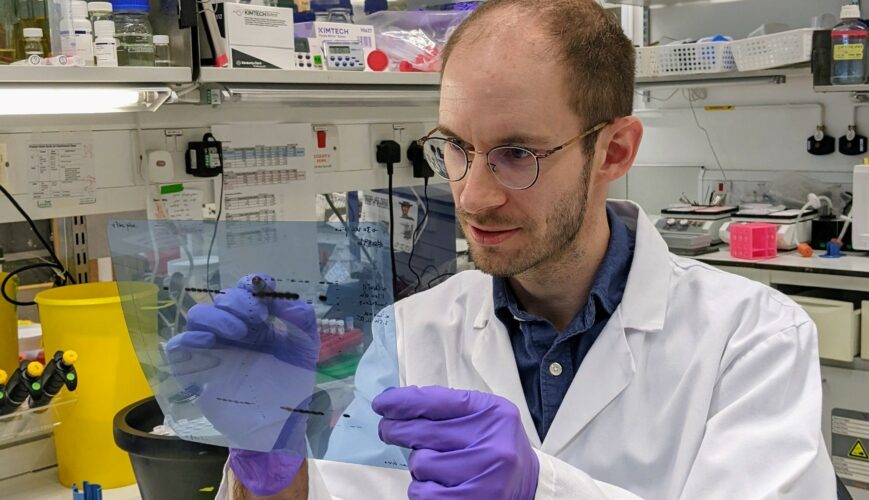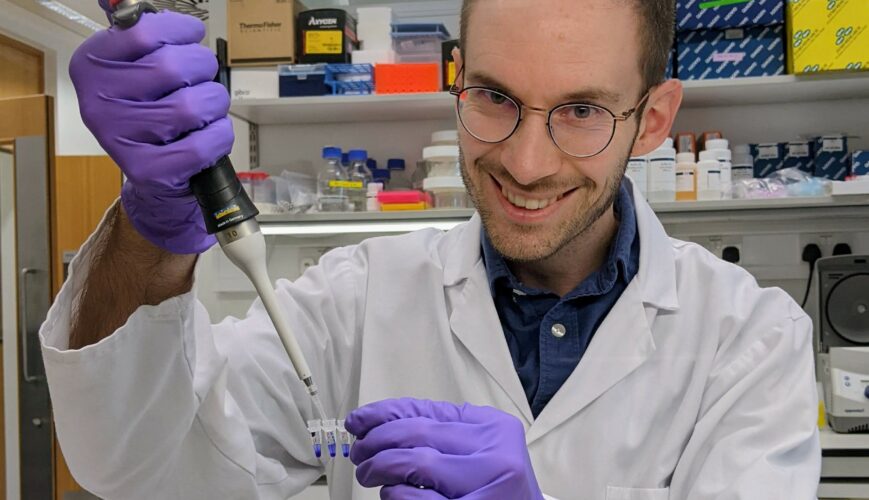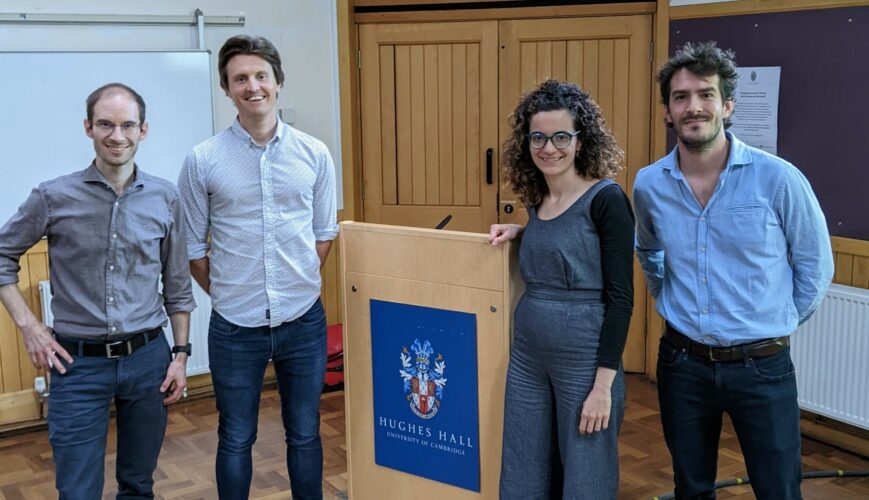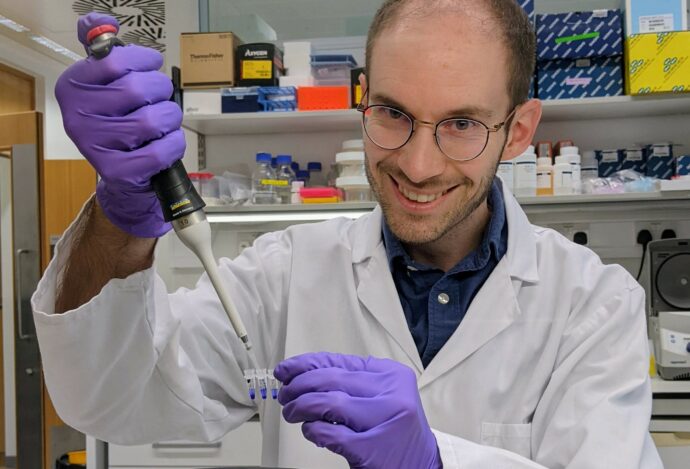A biochemist and cell biologist, Markus is interested in how cells maintain a functional state in a constantly changing environment, and throughout the lifetime of an organism, in order to help cure disease.
His latest work on tubulin has identified the protein mutation behind a rare disease syndrome making new treatment options a possibility.
“I particularly focus on the cellular mechanisms that control expression of the genetic material and that maintain cellular homeostasis. When gene expression is deregulated, we can experience symptoms of ageing-related diseases, such as neurodegenerative diseases like Alzheimer’s where faulty proteins accumulate. To cure diseases like these, we need to understand how cells normally work in the first place.”

Markus analysing cellular protein levels to understand how gene expression is regulated under stress conditions.
Journey to Cambridge
A Research By-Fellow at Hughes Hall and postdoctoral research fellow at the Medical Research Council Laboratory of Molecular Biology, Markus was born into a working-class family in Austria. He took his chance to attend university obtaining a degree in molecular biology in Vienna.
“I first got excited about lab research – and Cambridge – during my undergrad studies. I moved to the Cavendish Laboratory at the University for a research project in a biophysics lab to work on the mechanical properties of stem cells.”
Markus went on to undertake a PhD in cell biology at the Max Planck Institute of Biochemistry in Munich, working on cellular mechanisms of protein degradation during which he showed how controlled disposal of proteins is needed for cells to regulate their genetic material in the response to environmental stress conditions.
For his postdoctoral research, Markus was drawn to Cambridge again – this time joining the MRC Laboratory of Molecular Biology, an institute that has shaped modern molecular biology since opening in 1947, earning 12 Nobel prizes, including one for solving the structure of DNA.
For his research, Markus was granted prestigious fellowships from the European Molecular Biology Organization (2020) and a Marie Curie Fellowship from the European Research Council (2021).

Markus uses molecular biology and biochemistry tools to reconstitute biological reactions in test tubes to precisely understand their function.
Current research
His current work focuses on the regulation of a protein family called tubulins, which are essential for many processes in the cell, including cell division and the formation of cellular transport highways in elongated cells, such as nerve cells. Recently, his work unravelled the mechanism for an important feedback regulation that controls the amount of tubulin produced in cells (see publication).
“We recently solved the longstanding puzzle of how tubulin levels are accurately controlled by cells. We identified the mysterious protein SCAPER as an adapter molecule that links recognition of newly synthesized tubulin proteins to degradation of the encoding messenger RNAs by the cellular RNA decay machinery. SCAPER mutations cause a rare disease syndrome leading to intellectual disability, retinitis pigmentosa and male infertility, but the reason for these symptoms had been enigmatic.”
This work now links these pathologies to tubulin misregulation, potentially offering new treatment options for patients in the long run. Because tubulins are also an important drug target in cancer and inflammatory disease treatment, it is essential to understand how they are regulated in cells and how we can manipulate their function for therapeutic purposes. Such work joins a very long list of discoveries to come out the MCR Laboratory of Molecular Biology.
“Working here is truly inspirational. It’s a place where so many important discoveries have been made, for example the first protein structure was determined here. The atmosphere is very collaborative and resources are brilliant, allowing us to tackle the most important problems in molecular biology.”
“In time, I aim to establish my own research lab and continue to decipher the molecular mechanisms of how cells decide which genes need to be turned on and off at any given time. These are fundamental problems in cell biology with high relevance for human health and disease. For a human to stay healthy, individual cells like brain, muscle or bone cells need to accurately fulfil their functions.”
On Hughes Hall
Markus joined Hughes Hall in 2021 as a Research By-Fellow, and he took the lead of the postdoc community as Research Convenor in 2022. During this time, he organised activities for Research Fellows, but also for the wider College community, including several events with postgrad participation, such as the 3-Minute Thesis Competition and Early Career Fellowship panels.

Speakers at a Hughes Hall Early Career Fellowship event in 2022. From left to right: Dr. Markus Höpfler, Dr. Matteo Zallio, Dr. Marta Shahbazi, Dr. Jorge Lopez Tello
“Moving to Cambridge just before the pandemic made it challenging to build an academic network. Joining Hughes Hall gave me the opportunity to meet scholars from different disciplines and connect with senior members and students. Hughes Hall is an amazingly open and diverse place, and I really enjoy being part of it!
“Working in biochemistry myself, I cherish formal and social opportunities to meet researches in topics ranging from law and physics to education, climate policy or global health equality.”
“And, taking on the role of Research Convenor gave me a chance to connect with the whole Hughes Hall community and shape the events programme in College. It was a great experience working with fellow postdocs and meeting highly motivated students at the different events! I’m really thankful for the numerous ways in which Hughes Hall supports postdoctoral research fellows.”
Further information
To follow Markus’ work, check out his Google Scholar profile, follow him on Twitter @MarkusHopfler, or connect on LinkedIn.
To get in touch for potential collaborations, use mh647@cam.ac.uk.
If you missed the recent Open Day at the MRC Laboratory of Molecular Research, you can explore the lab in this fly through drone video.
17.8.23





